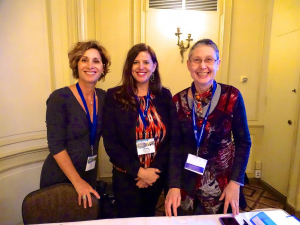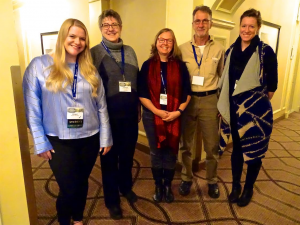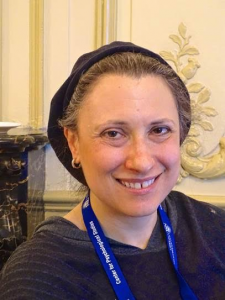By Reinhild Draeger-Muenke, PsyD, ASCH Trainer
The ASCH (American Society of Clinical Hypnosis) approved 20- hour training in clinical hypnosis has by now become a regular and expected feature at the ISSTD annual meeting. Several fundamental and intermediate trainings have been offered in the form of 3-day pre-conference workshops at the past several annual meetings, and interest and attendance have steadily increased, to the point that for the 2018 meeting not all applicants could be accommodated. By design, the trainings are capped at 21 participants. Three experienced faculty lead the conference in order to create a predictable and safe learning community, especially for the experiential small group segments of the training.

Gina Manlove, Wendy Lemke & Reinhild Draeger-Muenke, ASCH Workshop, Chicago 2018
This training in trauma and dissociation focused clinical hypnosis offers knowledge- and experience-based insight into an intricate auto-hypnotic process dissociative patients have been destructively engaged in, often for decades. Our already highly trained trauma therapists/ participants are learning to address trauma and dissociation through a (formal and informal) hypnosis-informed approach that allows for constructive flexibility and hypnosis-based problem solving even under difficult treatment circumstances.
In the process of intense learning, faculty and participants have the opportunity to co-create a unique environment that allows everyone, faculty and students alike, the safety to be creative, collaborate as a team, support one another in practicing new skills, and broaden existing treatment conceptualizations through clinical hypnosis skills. In both learning and therapeutic processes, clinical hypnosis invites an experience rather than solely imparting information. This foundational principle is at the heart of the conference training. We laugh at inside jokes and appreciate the diversity of what each of us has to offer. We as faculty strive (and prepare) to offer a safe, stress-free learning process for the participants, to be replicated with their patients in the process of integrating hypnosis into their treatment.

Gina Manlove and Wendy Lemke demonstrate the principles of spiral learning – Day 1, ASCH 3-Day Workshop, Chicago
The response to the most recent training provided by Reinhild Draeger-Muenke, Gina Manlove, and Wendy Lemke has been excellent. It is wonderful to read postings that participants are successfully incorporating their newly acquired hypnosis skills into their practice and are eager for more ASCH approved intermediate and/or advanced training.
Reflections of a participant – Warwick Middleton, MD
Board meetings precluded me for the past half-decade from being able to sign-on to take this extremely well-planned and presented 3-day course that covers the fundamentals of hypnosis and which allows all participants to practice hypnotic inductions and the

A beautiful setting to catch up after training, bar at Palmer House, Chicago
structuring of hypnotic interventions, in the most supportive environment conceivable. The presenters clearly are deeply connected to hypnosis, enjoy teaching, and all have great communication skills. Those undertaking the course ranged from student/emerging professionals, through to some of us that have been around for a while. They were a great group of colleagues with which to spend three days. I have very pleasant memories, including at the completion of Day 2 of dragging off another of the more senior participants, Paul Darnell, for a great “Old Fashioned” at the bar in the foyer of the Palmer House, as we admired the spectacular ceiling and soaked up the ambiance of the setting. This is not a training experience to be missed.
Reflections of a participant – Abigail Percifield – Student Member

ASCH workshop attendees Abigail Percifield, far left (Chicago, IL) with Laura Lee Clinchard (Lincoln, NE), Johanna Lynch (Brisbane, Australia), Quentin Dignam (Tamworth, Australia) & Megan Kolano (Stockbridge, MA
As a student entering her third year of doctoral studies, this training offered me a unique experience to learn the fundamentals of clinical hypnosis while surrounded by highly trained and skilled therapists. Not only was I able to soak up the knowledge of our instructors, but I was also able to learn from my fellow participants as we engaged in many small group sessions. Although I left the course feeling confident in my ability to guide someone into their own constructive trance experience and formulate constructive hypnotic suggestions, most importantly, I learned enhanced ways to be with my clients during therapy. Even for students who may not have a supervisor trained in clinical hypnosis, this course will offer invaluable insight into how newly trained therapists can engage with their clients in a more attuned way. The skills I learned in this course also extend into the personal realm, as I have learned how to utilize self-hypnosis to calm and center myself during moments of high stress. I often commented on how it was a stress-free learning environment as each experience with trance taught me more about how to relax myself. Without reservation, I would recommend this course as training for therapists of all levels.
Reflections of a participant – Mara Tesler Stein, Psy.D.

Mara Tesler Stein, Chicago resident and first-time attendee at ISSTD Annual Conference – at the ASCH Workshop
I have long wanted to learn clinical hypnosis, and when the stars aligned, making it possible for me to join this year’s ASCH Level I training at the ISSTD conference, I was thrilled, but nervous. It’s always humbling to approach a new modality as an absolute beginner. The vulnerability that engenders can leave me cautious and tentative about the new skills. Fortunately, we couldn’t have asked for warmer, more respectful and skilled trainers. Their depth of experience and breadth of knowledge meant that clinical questions could be addressed with complexity and nuance, making the training feel like far more than “basic”.
From the opening introductions, it was clear that we were invited to bring our whole selves to the training; to reflect on and, perhaps, share who we are as people and as clinicians. New or experienced. Knowledgeable about hypnotherapy, or strangers to the process. Each participant’s insights and contributions were encouraged and welcomed both in class discussion and in the small group practices. This made it so much easier to learn not only from our instructors, but also from one another. I left the training wanting to read more, learn more, talk more about hypnotherapy and how to integrate it into my clinical work. I left wanting to stay connected to the instructors and my classmates. How magical is that for a three-day training?
Photo Credits: Warwick Middleton,MD.

